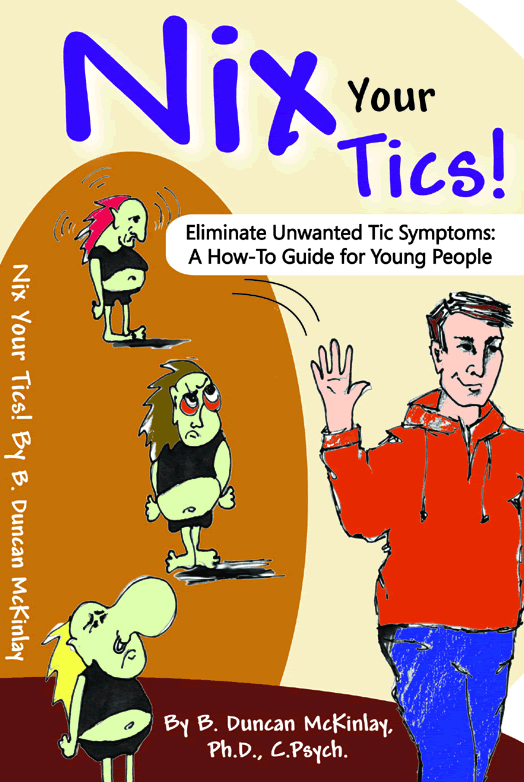Home
Nix Your Tics
Documentary
Writings
Youth Haven
Ask Dr. Dunc
Accolades
Presentations
Resources
Links
Disclaimer
Contact
If
you are a new visitor, diagnosed with a difference, please read this introduction
letter to you.
For
all other new visitors, Dr. McKinlay also has a
special introduction letter to you.

Nix Your Tics!
The Second
(E-)dition from "Life's A Twitch! Publishing". Click here to learn more.
To watch the Life's A Twitch! documentary via streaming video, click
here.
If
you would like to reprint writings from this site, please click
here.
Before
Signing the Guestbook

 
To
return to the 'Print Profiles' archive page, please click
here.
|
 |
1998 - 2018 |
 |
|
|
From
'freak' to 'wow' -- Duncan's Journey
BY LOUISE KINROSS
CONNECTIONS NEWSLETTER
BLOORVIEW
MACMILLAN CHILDREN'S CENTRE
From
the age of seven, I knew I had a secret. Something about me was
bad, and I had to hide it, because my parents and teachers would
get angry, and kids would laugh and point.
I
grew up with Tourette's syndrome, a neurological condition that
involves involuntary tics. I get stuck in repetitive movements
and noises - such as barking, whistling or shaking my head.
But
I didn't know I had Tourette's as a child, so I couldn't explain
what was happening. All I knew was that when the smallest tic came
out, people got mad or made fun of me. So I spent every waking hour
trying to suppress the tics. That made me an explosive, irritable
kid, and then a depressed, suicidal young man.
Finally,
at age 19, I was diagnosed. It felt like the weight of the world
had been lifted from my shoulders. Knowing I wasn't alone, and
that I could learn strategies about how to deal with the disorder,
was incredibly empowering.
It's
been 10 years since then, and my attitude towards life has changed
180 degrees. One of the most important things I've learned is that
it wasn't my disorder that was my problem growing up. It was my
perception of it. Because I hated my tics, I hated myself. Other
kids saw that I wasn't comfortable with 'me,' that I didn't think
I was worth much, and that set the tone for how they treated me.
Today
I recognize that how you live with a disability is largely how
you interpret it. I no longer see Tourette's as a death sentence
- but simply as a quality of me, no different from the fact that
I have blonde hair and blue eyes. I can't stop myself from 'ticing,'
but I do have control over how I react to it. I can choose to
accept myself, to have a sense of humour about my tics, and to
be open in explaining them.
When
I feel good about myself, I find I have an incredible amount of
control over how others respond to me. It's part of human nature
for people to look to others to gauge how they should react to an
unexpected situation. The day I pasted on a smile, shoved my shoulders
back, didn't break eye
contact, and walked the whole day like I was proud to be who I was,
people started to treat me differently.
Instead
of calling me "freak" on the subway, someone might come
up and say "wow, you're a really strong person." Then
one day I woke up and realized I didn't need to paste that smile
on my face because it felt like it belonged there.
Over
the years, I've learned how to use what I am to my advantage,
to see the different ways that having my disorder is an asset.
For example, Tourette's led me to my career. I'm a doctor of psychology
and plan to have a practice that focuses on children with Tourette's.
On weekends, I cross the country giving Tourette's workshops and
manage a related web site - called Life's a Twitch (visit www.lifesatwitch.com).
During the week, I'm completing an internship at Bloorview MacMillan.
Fear
and ridicule is something that I will always live with. It's a given
that every time I walk down the street, someone will pull their
kid closer and walk to the other side, or giggle with their friends.
I
deal with this by knowing that most people react that way because
my tics caught them by surprise. They weren't born with a file
in their head that said: "Things to do when someone barks
at me."
But
after that initial moment of surprise, 99 per cent of people will
pick up on my comfort with myself, and begin to respond differently.
In
situations where I may have a longer-term relationship with someone
- like at work - I've developed ice-breakers to help put people
at ease. For example, after a barking tic, I might smile and say
"Gotcha!" That lets the person know that I'm okay with
talking about my difference, and they don't have to worry about
broaching the subject.
I
tell kids with disabilities that it's their responsibility to explain
their difference to their friends.
For
the one per cent of people who go out of their way to be rude,
I've developed some handy comebacks. For example, if someone asks
me to stop ticing, I may say: "Gee, I hadn't thought of that
before! I could just stop. Wow, after so many years of being laughed
at for being weird, and that's all I needed to do." The point
is to make people stop and think about what they've just said,
and to make it clear that this is not my problem, it's theirs.
I've
reached a point where I can get 'reacted' at all day long, and rather
than feeling beaten down, I feel good about myself, because I know
I'm clearing a path for others like me.
Top
of Page |